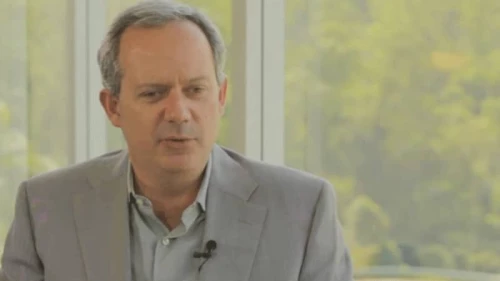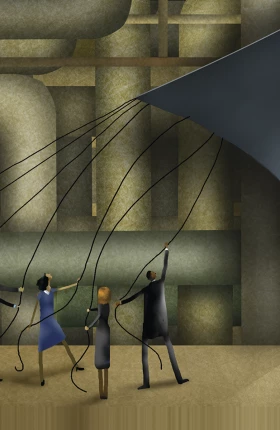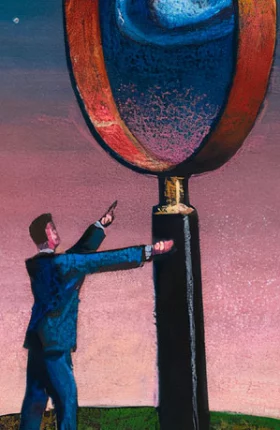Alessandro Carlucci joined Natura nearly a quarter century ago, when the Brazilian cosmetics company was small, entrepreneurial, and still run by its founders. He served as CEO for almost a decade through September 2014, leaving behind a company of nearly 7,000 employees, a direct sales force of 1.5 million beauty consultants, a strong presence throughout cosmetics-crazy Latin America, and annual sales approaching $3 billion.
In the face of such growth, Carlucci worked with his team to ensure that Natura would not become what he called a “typical company”—one filled with bureaucratic procedures and disenfranchised employees. One of Carlucci’s primary goals has been to “disassemble the machine,” in his words. He sought to help Natura to retain—and in some cases, return to—the can-do and do-good culture of his early years.
Natura was never a typical cosmetics company. Its slogan—“bem estar bem”—means “well being well.” With a focus on sustainable development, it sources ingredients indigenous to the Amazon ecosystem; the company began using recyclable material for containers before the practice became fashionable.
Growth is as much a part of the company’s DNA. Carlucci focused on keeping Natura growing and on combating inevitable complexity in the organization by unleashing the potential of Natura’s people, connecting to the sales force and customers through social media and technology, and becoming more adaptive and experimental.
Shortly before he left Natura, Carlucci sat down to discuss complexity with Christian Orglmeister, a partner and managing director in BCG’s São Paulo office. Edited excerpts from that conversation follow.
At many growing companies, particularly consumer goods companies, leaders start to think about the organization, and its different segments, different geographies, and different product lines, and then suddenly realize that the organization has become a big monster. How do you deal with that?
It is very honest to say that we have already become, in some ways, a typical corporation, and we need to disassemble the machine—if I can use this expression—otherwise the machine will continue making decisions for us. Instead of driving the machine, the machine is driving us. So we decided—with some courage—to start a cultural project and to face the tough decisions.
I’m calling it the machine. The machine was designed and built by us. I may be the main architect of this machine, so I must be humble enough to allow this machine to be disassembled.
We want to disassemble the machine and build something new. To be honest, before you ask, I don’t know what the future is, but we know what we don’t want to have.
We don’t want to have a bureaucratic company. We don’t want to have a company in which people are very far from the decisions and people don’t feel engaged. We want people to be engaged with the purpose of the company.
What are you thinking about the capabilities of your leadership team and throughout the company? What are you trying to get out of these leaders? How do you prepare them for the future?
We need to focus on emotional competencies, the so-called soft ones. I think that we need to be more open—really open, vulnerable. It is difficult for leaders to recognize that they don’t know everything; this goes against our mental model. But only by doing that can we really build the trust needed to work in a more collaborative way.
I truly feel that competition is medieval. How can we really use the potential of people? I don’t have a precise number, but I think that most of the companies today use less than half of the potential of their people. We are often more attached to your position—what is on your business card—than who you really are.
As a CEO, how do you make sure that you are still connected to what’s happening on the ground with your sales force and with your customer?
We decided two years ago to invest dramatically in IT and digital technology. We believe that we really can transform our business and become very close to the customer so the customer is only one click away. This is the answer for me: technology, technology, and technology.
When you think about using technology to reduce complexity, what we observe is that sometimes the opposite happens. We suddenly are exposed to much more data that we can process.
We need to split the noise from the good data through intuition. Otherwise it’s impossible. We have so much information today that you can spend your whole life trying to find the right reason to do something. Of course, you need data, but you cannot forget to use your intuition and your personal beliefs.
Complexity itself can also be a good thing because it presents many opportunities. Do you see opportunities emerging for Natura from today’s increasing complexity not only in data but also in relationships, marketing positions, and businesses?
The way that we are trying to deal with this is by avoiding predictions, starting things quickly, and making adjustments as quickly as we can. Instead of planning for three years and then starting something that is already dead, we are trying to start with less information and less planning.
We are trying to adjust—with the customer and our beauty consultants—and use the network and our people to define what is relevant instead of doing research and analyzing everything. Of course, we need to plan some of the initiatives, but we increasingly want to do things by learning on the job. If we decide that something is not working, we can kill the initiative. But we need to start before we have all the answers. This is the way to deal with complexity, in my opinion.
What makes you most proud of what you’ve done so far as a CEO?
When you grow, when you become big, the culture of the company starts to dilute, and you start to become more of the same. We have the opportunity to keep growing—growth is part of the DNA of Natura—and to try not to become a typical corporation. I’m talking about how we are structured, our organization, the governance—all the accessories that make a company.
We are in a very special moment. We want to be a different company, as we were when we were smaller. Now that we are big, we have this challenge.






